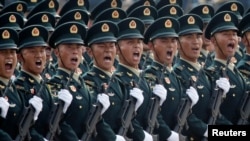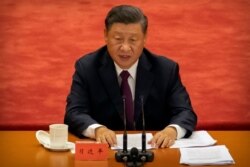An American journalist who has covered China for two decades recently called for more people to become People's Republic of China hawks to confront the rise of Beijing as a global power. In Canada, some former friends of China have also changed their minds.
American journalist Michael Schuman has attracted attention with a recent article on news site Politico in which he described how he evolved from being enamored with everything about China to a much more cold-eyed outlook.
"Like many of us who write about China, I became mesmerized by the place upon first setting foot there, which for me was in 1996," he wrote.
However, “the more time passed, the more my mood has darkened,” he continued, explaining that “part of the change can be perhaps attributed to my living in a place where the individual has no recourse against the state.”
Schuman added that developments over the past three years made him “truly hawkish.”
Especially alarming, he said, is that Chinese President Xi Jinping “is trying to change the way we think about good government and democratic values” and increasingly is “upholding China’s autocratic system as every bit as legitimate — and even superior — to Western-style representative government.”
This “assault,” Schuman wrote, “presents a greater threat to the world’s democracies than any edge it might achieve in trade or technology.”
Schuman concluded his piece saying, "The only way to contend with today’s China is for more people to become China hawks. That’s a terrible solution. But the alternative is worse."
Margaret McCuaig-Johnston, who served nearly four decades in various official positions in Canadian provincial and federal governments, has come to the same conclusion.
“I was a friend of China for 40 years since my first visit in 1979 and helped them build their science and technology capacity. In fact, I was even vice president of the Canada-China Friendship Society from 2014 to 2016,” McCuaig-Johnston told VOA in written responses to questions.
“Canada has a very deep history in China going back to the 1920s, ’30s and ’40s with missionaries going throughout China. I knew one, Dr. Robert McClure, who left when the communists took over. He often spoke at my minister father’s church and would come to our house for lunch or dinner and told great stories.”
McCuaig-Johnston dedicated herself to advancing Canadian Chinese ties, especially in the area of science and technology, until she retired from government in 2012, serving at one point as executive vice president of the Natural Sciences and Engineering Research Council. For the last seven years of her government career, she was a member of the Canada-China Joint Committee on Science and Technology.
“Over the years when I was in government, I worked often with people in China, helping that country to build their science and technology capacity,” she said.
Over time, she began to have second thoughts. But it was the detention in China of two Canadians — Michael Kovrig and Michael Spavor — that finally compelled her to change her position. The two were arrested in December 2018 in apparent retaliation for the arrest of a Huawei executive in Vancouver and remain in Chinese custody.
“I was in Shanghai when (the two Michaels) were detained. I mentioned the detentions to a Chinese national with whom I was meeting the next day, and I was shocked to hear him say that China has a list of 100 Canadians they can pick up and detain at any time.
“When I got back to Canada, several others told me about the list. I expect there are lists for other countries, too,” said McCuaig-Johnston, who had been in Shanghai to speak at an international conference marking the 40th anniversary of China’s science and technology policy.
Reflecting on her decades of helping Beijing acquire science and technology, McCuaig-Johnston said, “For decades, I and many other Canadian officials and scientists helped China build their innovation capacity.”
She said initially, her Chinese counterparts “were very grateful … they took in all our help, advice and expertise.”
But things changed over time, she said.
“In the past few years, they have been more selective and want the best of our scientists in AI, biotech, quantum and advanced materials that reflect China’s strategic technologies,” McCuaig-Johnston said.
She said China’s intent “is now to surpass other countries, including the U.S., on science and technology and to put all that at the service of the military. They do not want to collaborate with us, as we did with them, unless it can help them become an innovation and military superpower.
“We should not be helping them do that,” she continued. “They have completely lost my trust and that of many other Canadians.”















